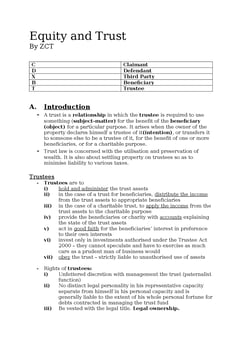Re Shaw [1957] 1 WLR 729; [1957] 1 All ER 745
Judgement for the case Re Shaw
Table Of Contents
KEY POINTS
Charity, in a legal context, refers to the act of providing benevolent aid or support to individuals or communities in need.
Education, a fundamental societal institution, involves the process of acquiring knowledge and skills.
-
The term "Alphabet" pertains to a set of letters representing the basic sounds of a spoken language.
Trusts dedicated to inquiries into the practicability and effect of substituting a new alphabet for the existing 26 letters raise questions about their charitable nature.
Similarly, trusts focused on transliterating literary works into the proposed new alphabet and publishing them alongside the present alphabet for comparison warrant scrutiny to determine their charitable status.
-
The concept of a trust involves the possibility of court execution, enabling the legal implementation of the trust's provisions.
Trusts designed solely for the benefit of specified objects require examination to establish their charitable nature.
Trusts marked by uncertainty regarding their terms or objectives pose challenges in legal interpretation and execution.
FACTS
George Bernard Shaw ("Testator"), through his will, instructed his Public Trustee (“Trustee”) to manage the residuary trust funds and their annual income for a specific duration of 21 years after his death.
-
The Trustee was directed to undertake various inquiries during this period, including determining the number of individuals speaking and writing English using the established 26-letter alphabet, known as "Dr. Johnson's alphabet."
The Trustee was tasked with assessing the potential time saved per individual scribe by substituting this alphabet with a proposed British alphabet containing at least 40 letters.
This new alphabet aimed to enable English writing without indicating single sounds through letter groups or diacritical marks, utilizing one symbol for each sound.
-
The inquiries also included estimating the number of individuals worldwide engaged in speaking and writing English at any given moment and evaluating the time and labor wasted due to the lack of unequivocal syllables.
The Trustee was further instructed to add estimates of time lost or saved and calculate the potential loss of income in British and American currency.
The Trustee was to employ a phonetic expert to transliterate the Testator's play, "Androcles and the Lion," into the proposed English alphabet, assuming pronunciation similar to that recorded by H.M. King George V.
An artist calligrapher was to fair-copy the transliteration for reproduction, and the final step involved publishing the transliteration with the original "Dr. Johnson's" lettering opposite thereto, presenting copies to libraries in the British Isles, the Commonwealth, and America.
JUDGEMENT
-
In the judgment, it was held that the declared trusts had failed for several reasons.
Firstly, the objects of the trusts, if considered as tending to increase knowledge, were not inherently charitable unless coupled with provisions for teaching and education, which were found to be lacking in this case.
Secondly, the objects were deemed not beneficial to the community in a manner recognized as charitable by law. Trusts related to advertisements, propaganda, and research on a controversial matter were considered ineligible for charitable status, resembling trusts for political purposes instead.
Thirdly, since the trusts were not charitable and were intended for the benefit of an object rather than an individual, they were not subject to the court's control.
Finally, the court concluded that it was not within its purview to validate these trusts by treating them as powers.
Therefore, due to these various factors, the declared trusts were determined to have failed.
COMMENTARY
The legal concepts of charity, education, and trusts begin by defining charity as benevolent support, and education as acquiring knowledge, and introduce the term "Alphabet."
The focus then shifts to trusts dedicated to investigating a new alphabet's practicability, transliterating literary works, and their potential charitable status.
-
George Bernard Shaw will instruct a Trustee to conduct extensive inquiries and publish transliterations.
However, the judgment held the trusts failed due to a lack of educational elements, a non-charitable nature, and the inability for court control, ultimately deeming them unsuccessful.
For Further Study on Re Shaw
Need instant answers? Our AI exam tutor is here to help.
Ask questions 🙋 Get answers 📔 It's simple 👁️👄👁️
Our AI is educated by the highest scoring students across all subjects and schools. Join hundreds of your peers today.
Get StartedRelated Product Samples
These product samples contain the same concepts we cover in this case.
| Trusts and Equity | Charitable Purpose Trusts Notes (17 pages) |
| Trusts and Equity | Charitable Trusts Notes (17 pages) |

